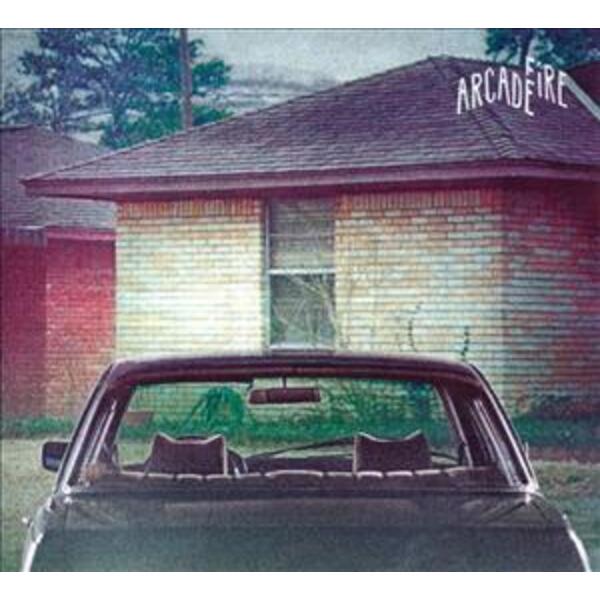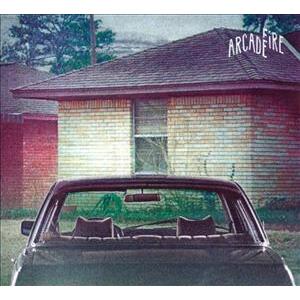Information/Write-up
Arcade Fire never aim for anything less than grand statements. That quality has played a huge role in making them very, very popular; it's also their greatest weakness. Funeral was wracked with agony and grief, but what made it one of the transcendent records of the 2000s was that it avoided easy answers. It proposed that the fight of our lives is just that, a fight, but a winnable one. But when they turned that same all-or-nothing intensity outward on Neon Bible, otherwise propulsive and elegant songs were sometimes bogged down by overblown arrangements or pedantic political statements. You'd figure an album bluntly called The Suburbs that focuses on The Way We Live might repeat some of Neon Bible's worst tendencies. Instead, it's a satisfying return to form-- proof that Arcade Fire can still make grand statements without sounding like they're carrying the weight of the world.
The metrics of The Suburbs are misleading: At 16 tracks, including interludes and multi-part songs, it might seem like Arcade Fire are shooting for their Sandinista!, Kiss Me, Kiss Me, Kiss Me, or Sign O' The Times-- a band at the peak of their powers reacting against the walls closing in by blowing everything up and trying anything. But the album actually plays out more like Bruce Springsteen's The River, a generously paced collection of meditations on familial responsibility, private disappointments, and fleeting youth, much of which takes place in moving vehicles. It also reintroduces much-needed levity to an act that can be overbearingly self-serious. On the deceptively chipper chamber pop of "Rococo", Win Butler borders on patronizing, evoking Nirvana's "In Bloom" and using the title word as a sword to skewer an easy target: the hipster more concerned with following trends than locating a genuine understanding in the world around him. But the point is that Butler values directness and truth, and throughout The Suburbs, what he lacks in poetry, he makes up for with honesty.
There's a tension between the uneasily resolving chords and lightfooted piano shuffle on the title track, as Butler sings in a restrained falsetto: "Sometimes I can't believe it/ I'm moving past the feeling." As The Suburbs plays out, that "feeling" is one that lived on Funeral and is dying here. The initial fantasy of Funeral was escaping the neighborhood, dancing beneath the police lights, and living on misbehavior. The Suburbs can be seen as the update decades later, with those same kids having kids of their own, and moving back to and struggling in the same neighborhoods.
The heavy-handedness that marred some of Neon Bible mostly resulted from Butler's warning us of destruction caused by the lies of authority figures-- shady cultural impresarios, corrupt church leaders, politicians all too eager to push the button. But what makes The Suburbs a more humane and empathetic record is that Butler and Régine Chassagne have come to terms with how the pain of our day-to-day lives more often results from the lies we tell ourselves. At the outset of "We Used to Wait", staccato, minor-key piano chords evoke anxiety. The song is a simple lament about the exhaustion from a relentless pace of life that demands everything immediately. But as Jeremy Gara's steady drums lift the piece into cathedral drama, it's obvious that there's a deeper concern than the antiquation of letter-writing. By the time the narrator finds himself with "the lights cut out... left standing in the wilderness downtown," it's a sad reminder that giving up your dreams for a reliable job that pays your way and corrodes your soul isn't even a reliable option anymore. Soul-sucking work was at least once a dependably secure and profitable enterprise. Now what do we do?
The bulk of The Suburbs focuses on this quiet desperation borne of compounding the pain of wasting your time as an adult by romanticizing the wasted time of your youth. As bleak as the lyrics are, though, they're buoyed by the band's leanest, loosest songwriting yet. These songs are busy, but never overly complicated, subtly nudging at their boundaries while allowing wide lanes for Butler's perfectly memorable melodic turns. The framework is familiar: Arcade Fire's trademark of decorating AOR with orchestral fringe ("Ready to Start", "Empty Room"), sun-baked Harvest gold ("Wasted Hours", "Suburban War"), and in the record's highlights, pulsating electro ("Half Light II [No Celebration]", "Sprawl II [Mountains Beyond Mountains]").
But The Suburbs is a record that seeks to build, and it reaches a monumental peak at its closure. Both parts of "Sprawl" act like a conversation between lovers and a treatise on what makes Arcade Fire tick: Butler's despondence on "Sprawl I (Flatland)" matches the desolate atmosphere that surrounds him-- returning to a mall-spackled hometown is an admission of defeat. But as with their first two albums, the penultimate song towers over what came before: "Sprawl II" is an Arcade Fire song through and through, balancing a sort of defiance in the midst of crushing circumstance ("These days, my life, I feel it has no purpose/ But late at night the feelings swim to the surface"). It's a rare and thrilling example of the group stepping out of their musical comfort zone, an airy disco bounce evoking "Heart of Glass" that serves as further evidence of just how crucial the often underappreciated Chassagne is in tempering Butler's grimmer outlook.
That said, the relative concision of Funeral and Neon Bible didn't allow for a whole lot of wiggle room. And while it's somewhat heartening to hear something allowed to be a "minor" Arcade Fire song, they're still, well, minor. "Month of May" strains too much for a ragged punk glory while the folky, Neil Young-ish strummer "Deep Blue" doesn't develop its Kasparov vs. IBM metaphor into more than an afterthought. And as The Suburbs reaches its second half, there's certainly some thematic redundancy-- surely, there's already a drinking game revolving around Butler's use of "the kids."
There's also the possibility that The Suburbs can be seen as a lesser Arcade Fire album if you mostly value rock music for its escapism. This is another 2010 example of a Boss-indebted band (see also: the National and Titus Andronicus) making epic outpourings of modern disillusionment and disappointment for people who can commiserate and return to fretting about their jobs and bank accounts once the house lights go up. But just because the concerns of The Suburbs are at times mundane, that makes them no less real. And that Arcade Fire can make such powerful art out of recognizing these moments makes our own existences feel worthy of documentation. By dropping Neon Bible's accusatory standpoint, The Suburbs delivers a life-affirming message similar to Funeral's: We're all in this together.
-Ian Cohen, August 2, 2010


No Comments